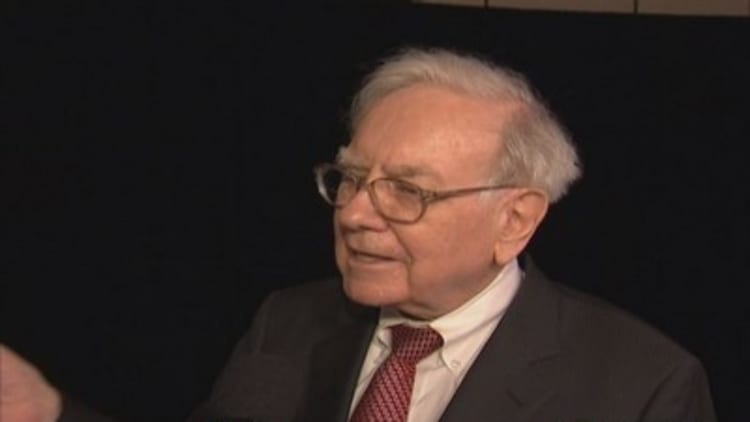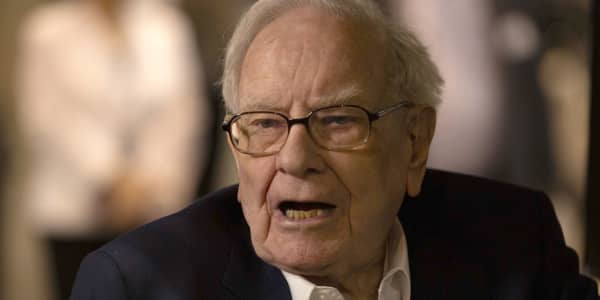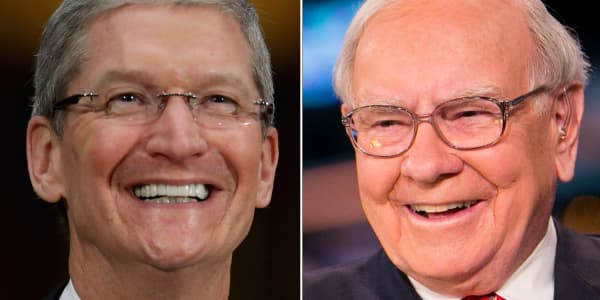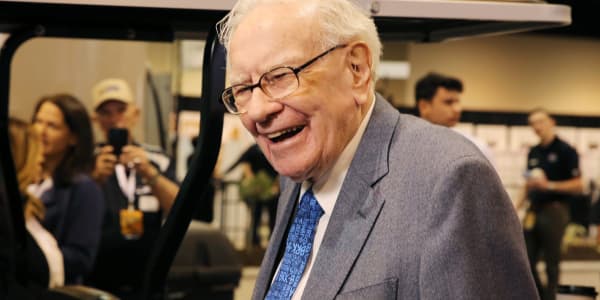Warren Buffett told shareholders that Berkshire abstained in a vote over Coca-Cola's controversial executive pay plan because he didn't "want to go to war" with the company but did want to express his unhappiness with a plan he called "excessive."
Speaking before roughly 38,000 shareholders at Berkshire Hathaway's annual meeting in Omaha, Buffett said abstaining was the "most effective way" for him to make a "clear statement" opposing the plan. "I don't think going to war is a very good idea in most cases."
Buffett said there's a social dimension to being on a board. Even "independent" directors aren't really all that independent because they often want to keep a prestigious job that pays well and has relatively few duties.
When choosing board members, "They do not look for Dobermans. They look for Cocker Spaniels and then they make sure their tails are wagging."

In addition, Buffett said that if someone on a board votes against proposals that person would lose influence with fellow directors. "If you keep belching at the dinner table, you'll be eating in the kitchen."
Read MoreLive blog: Berkshire's 2014 annual meeting
Buffett said he didn't remain totally silent about his opposition. He said he met with Coke CEO Muhtar Kent before the vote and told him Berkshire would abstain, and publicly spoke on CNBC about his opposition to the plan immediately after Coke announced it had been approved by 83 percent of the share voted.
Buffett also said he disagreed with activist investor David Winters' argument on the extent of the plan's dilution of existing shareholders, making him even less willing to join Winters in a "war" against the company.
Buffett told CNBC on Thursday that he believes Coke will be responsive to shareholder concerns about the plan and he wouldn't be surprised if there's a revision before the plan goes into effect next year.
Berkshire owns 400 million shares of Coca-Cola, just over 9 percent of the shares outstanding.
Buffett criticized a staple of corporate governance reform: the government's requirement that corporations publish the salaries of their highest paid executives. It "very seldom" helps shareholders, he said, because it just provides "jealous" CEOs more ammunition to push for more money so they don't fall behind. "There's no CEO who looks at proxy statements and comes away thinking they should be paid less... It is only human to look at a whole bunch of proxy statements and say, I'm worth a lot more than that guy."
He also said pay disclosures should not be expanded from executives to include a company's top earners.
Charlie Munger, Buffett's longtime business partner, added, "Envy is doing the country a lot of harm. We take actions to dampen envy."
Buffett's salary as Berkshire CEO is $100,000 a year. He suggested his successor will get a bigger paycheck. "They're certainly entitled to be paid a lot... I'm going to write about that very question next year in the annual report."
Buffett rejected the idea of moving Berkshire's headquarters overseas because U.S. taxes are too high. He said that while Berkshire doesn't give the government more than it needs to, it does not "begrudge" paying taxes. "We've made a lot of money while paying U.S. taxes."
Munger added, "I think it would be crazy to be as prosperous as Berkshire and get our tax to zero."
Among other topics covered:
- Buffett said that if Google's self-driving car does eventually prevent accidents, it would be a "real threat to the auto insurance business," including Berkshire's GEICO. He thinks, however, that any change would take a long time to happen and GEICO will be doing more business five years from now.
- Buffett praised Janet Yellen's work as Federal Reserve chair based on what he's seen so far and said he wouldn't change the central bank's "zero rate" policy. While low rates have helped boost asset prices, Buffett said he doesn't think there is now a bubble in financial markets, although there still could be one in the future. But, he said, "It's an unusual situation we're living in."
- Buffett said Berkshire is "very likely" to team up again with Brazil's 3G Capital, "perhaps on some things that are very large." That's despite criticism 3G has cut too many jobs at HJ Heinz, the food giant they bought together last year for a total of $23.3 billion. "I think 3G does a magnificent job of running businesses." He added, "We have not enforced, or attempted to enforce, nor do we wish to enforce, a strong discipline in every subsidiary as to whether they have a few too many people or not. A great many don't."
- While he likes to keep a cash cushion of at least $20 billion so Berkshire doesn't have to "rely on the kindness of strangers," Buffett said he'd be willing to take on debt for a "really good deal," even if it cost as much as $50 billion.
- He acknowledged there have been service problems at BNSF, Berkshire's rail subsidiary, and gave some of the blame to very cold winter weather. Buffett said he's ready to spend a lot of money to "have the best railroad possible" but has no plans for it to buy other businesses.
- Buffett's will calls for most of the money inherited by his wife to be put into an S&P 500 stock index fund. Asked if that means he thinks Berkshire shares won't do as well after he dies, Buffett said the advice is more for "peace of mind" than maximizing returns. "There will be loads of capital left over" for her.
- Buffett denied that he was changing the "goalposts" by using his annual letter to highlight Berkshire's win against the S&P over the six-year stock market cycle ending in 2013, rather than his usual five-year comparison. For the first time, Berkshire failed to beat the S&P in the 2009-2013 period. He has repeatedly said Berkshire has trouble beating a strong stock market. Munger said the company's billions of dollars of gains make it unnecessary for Buffett to apologize.
- Buffett said it's "getting more fun" to report the results of his 10-year $1 million bet for charity against hedge funds. After six years, the low-cost S&P index fund he selected is up 43.8 percent vs. 12.5 percent, after fees, for five funds of funds selected by New York-based Protégé Partners. It's part of his argument that it's hard to beat the market so investors shouldn't pay someone else to attempt it.
- Asked by a shareholder from Chicago if he had any interest in buying a professional sports team, Buffett said no and joked, "If you read either of us is planning to buy a sports team, it may be time to talk successors." Forbes repeated last month that Buffett was "interested" in buying a small piece of the Chicago Cubs baseball team.
- Before the meeting began, Buffett told reporters he had lunch with General Motors CEO Mary Barra last week and he thinks she's doing a good job handling the automaker's recall controversy.
—By CNBC's Alex Crippen. Follow him on Twitter: @alexcrippen (Reuters contributed to this report.)





